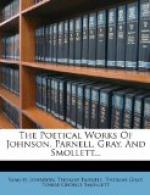END OF PARNELL’S POEMS.
* * * * *
THE LIFE AND POEMS
OF
THOMAS GRAY.
How dearly, at one time, and how cheaply at another, does Genius purchase immortal fame! Here a Milton
“Scorns delights, and lives laborious days,”
that he may, through sufferings, sorrows, and the strainings of a long life, pile up a large and lofty poem;—and there a Gray, in the intervals of other studies, produces a few short but exquisite verses, which become instantly and for ever popular, and render his name as dear to many, if not dearer, than that of the sublimer bard; for there are probably thousands who would prefer to have written the “Elegy written in a Country Churchyard,” instead of the “Paradise Lost.”
Thomas Gray was born in Cornhill, London, on the 26th December 1716. His father was Mr Philip Gray, a respectable scrivener, and his mother’s name was Dorothy Antrobus. Gray was the fifth of twelve children, and the only one that survived. His life was saved in infancy by his mother, who, during a paroxysm which attacked her son, opened a vein with her own hand. This, and many other acts of maternal tenderness, rendered her memory unspeakably dear to the poet, who seldom mentioned her, after her death, “without a sigh.” He was sent to study at Eton College, the happy days spent in which he has so beautifully commemorated in his “Ode on a Distant Prospect of Eton College.” It added to his comfort here that his maternal uncle, Mr Antrobus, was an assistant-teacher. From Eton he passed to Pembroke College, Cambridge, where he was admitted as a pensioner in 1734, in the nineteenth year of his age. He had at Eton become intimate with Horace Walpole and with Richard West, a young man of high promise, who died early. It is worth noticing that, during his residence both at Eton and Cambridge, he was supported entirely out of the separate industry of his mother, his father refusing him all aid.
At Cambridge, Gray studied very hard, attending less to mathematics than to classical literature, modern languages, history, and poetry. He aspired to be a universally accomplished as well as a minutely learned man. His compositions, from 1734 to 1738, were translations from Italian into Latin and English, and one or two small pieces of original verse. In September 1738, he returned to his father’s house, and remained there for six months, doing little except carrying on a correspondence he had begun at Cambridge with West and other friends. Correspondence, from the first and to the last, was the best OUTCOME of Gray’s mind—he felt himself most at home in it; and, next to Cowper’s, his letters are the most delightful in the English language.




